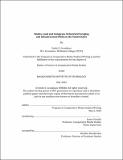Bodies, Land, and Instagram: Networked Foraging and Infrastructural Media in the United States
Author(s)
Grandjean, Emily E.
DownloadThesis PDF (17.44Mb)
Advisor
Paradis, James
Terms of use
Metadata
Show full item recordAbstract
This thesis examines the ways in which people in the United States use social media to learn about, practice, and share their experiences of foraging. Through an exploration of the histories of the U.S. high-tech industry and federal land ownership and private property systems, I discuss how colonial, capitalist, patriarchal, and white supremacist logics converge as an ecological regime that exploits bodies and land, accruing power to wealthy, white people and corporations. Acting within this ecological regime, networked foragers use a variety of technologies and techniques to orient themselves within their local environment and develop group-based “skilled vision.” Some networked foragers use their bodies and foraged foods as biotechnologies with which to intimately connect with the land, develop new relationships, and maintain local ecosystems. At the same time, the learning process for some networked foragers may be limited by Western, colonial scientific perspectives and “expertise.” I observe that online interactions may, in some cases, foreclose difficult but generative conversations about foraging ethics and the needs of more-than-human forms of life. Finally, I find that social media platforms may encourage a networked foraging culture of spectacle, entertainment, and consumerism, and discourage the interlinking of foraging with politics and ethics.
Date issued
2022-05Department
Massachusetts Institute of Technology. Program in Comparative Media Studies/WritingPublisher
Massachusetts Institute of Technology